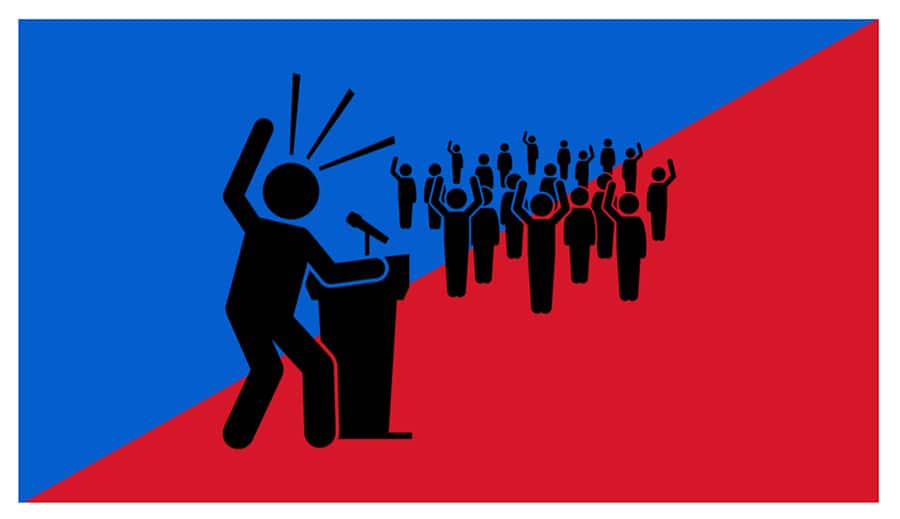
A few months ago I received a call from the head of HR of a global company who told me about how politics had invaded her workplace and caused a major uproar. It seems that a couple of members of the C-Suite got into a very public political argument in front of a town hall meeting. Afterwards, apologies were made, but it left a very bad taste in everyone’s mouth – to the point where no one talks about what happened except to refer to it as “the incident,” and that the big lesson learned is to “don’t talk politics or society or the culture wars at work, ever.” This has created a culture of fear, and now everyone is walking around on eggshells. “It’s really concerning,” she said, “and it’s not how our culture has always been. We used to be much more comfortable with our diversity of thought and opinion. Not any more!”
The fact is, organizations often see friction between individuals and groups due to both conscious and unconscious disrespectful behaviors that can be based on deep-seated political and ideological beliefs. These challenges result from stereotyping by political identity, misinformation coming from social media, and conflicts arising from differing ideologies and belief systems. Other common behaviors that result include people dismissing each other as “too sensitive,” or “too rude,” which leads to further distancing among team members.
At CRL, our research indicates that society is experiencing unprecedented levels of public disrespect – where people treat each other badly out in the open – reminiscent of the peak periods of the Vietnam War. Unfortunately it now appears that this public disrespect is permeating our workplaces, causing significant stress.
The pandemic has further compounded this issue, creating an ongoing VUCA (Volatile, Uncertain, Complex, and Ambiguous) business environment. A term originally coined by the US Army War College to describe battlefield conditions, VUCA is now used by business leaders to describe erratic and unpredictable, high-stakes business environments. In addition to public disrespect, increased VUCA incidents, coupled with the significant stress caused by the pandemic, are driving higher levels of disrespect in the workplace overall.
Additionally, societal stress levels are considerably higher now than before the pandemic. Stress is the number one driver of disrespect and toxic behavior. According to a study released by MIT last year, a toxic work environment is ten times more likely to cause someone to quit than compensation issues.
Glassdoor data from November of last year revealed that 61% of employees had engaged in political discussions at work in the previous 12 months. Interestingly, while 82% of workers are comfortable working with colleagues who have different political opinions, they are less comfortable discussing these topics.
Generational comfort levels with political discussions at work vary. Boomer men are notably more comfortable than Boomer women, Gen X women, and younger generations, including Millennials and Gen Z, with Boomer men being the most comfortable. Younger generations, particularly Millennial and Gen Z women, show a relatively higher comfort level in discussing political topics compared to older generations.
Among all generations, 55% are comfortable with their company and CEO taking a public political stance on various cultural issues. However, if a company’s stance conflicts with their personal views, 31% consider leaving the company. This sensitivity is particularly pronounced among Gen Z employees.
Although American voters are less ideologically polarized than often portrayed, emotional polarization persists. Emotional reactions are triggered by merely learning someone’s political identification, which hinders healthy, open dialogues. Emotional polarization makes it significantly more challenging to engage in constructive conversations.
We have developed strategies to mitigate. Here are the steps:
1 – Acknowledge and Validate Emotions
Acknowledging someone’s passionate beliefs helps transition their emotional responses to a more rational one. You don’t have to agree or disagree with them, but simply saying, “I can tell you feel strongly about this” is likely to get them to calm down.
2 – Use Common Agreement
Using phrases like “I think we can all agree” helps build common ground, de-escalating tension by focusing on shared understanding rather than differences. One of the easiest things to say is, “I think we can all agree that this is a very contentious and tense period right now.”
3 – Deflect to Work-Related Topics
After addressing emotions and establishing common ground, steer the conversation back to work-related topics. One effective way to deflect away from politics is to say, “I don’t think we’re going to be able to solve this now, we’re going to have to leave it up to the voters.”
If an incident arises, follow up privately using the SBIR (Situation, Behavior, Impact, Request) technique. Describe the specific situation and behavior without judgment, explain the impact of the behavior, and make a request for future behavior.
If someone makes a political outburst, have a private conversation with them using the SBIR model:
- Situation: “Remember the meeting this morning when you shared your strong political opinion?”
- Behavior: “Your comments were very passionate and forceful.”
- Impact: “This spins everyone up and creates a charged and sometimes negative atmosphere.”
- Request: “In the future, please consider how your comments might impact the team.”
This approach helps individuals recognize the impact of their actions, encouraging more respectful behavior in the workplace.
At CRL, we encourage our clients to create and sustain ARCs (Actively Respectful Cultures) within their organization by operating by both the Golden Rule (do unto others as you would have them do unto you) and the Platinum Rule (do unto others as they would have you do unto them). This requires high emotional intelligence and a conscious effort to treat each other with respect and civility. It’s not hard, but the company has to deliberately choose to do it.
Organizations that foster a respectful culture see increased job satisfaction by 63%, higher engagement by 55%, improved focus by 58%, and higher retention rates by 100%. Employees who feel respected are significantly more motivated and engaged.
Another approach is to train and empower leaders and/or respected individuals in your organization to become “upstanders” who can significantly influence and improve the workplace climate. Upstanders can intervene in heated discussions and promote respectful dialogue, encouraging bystanders to support a culture of respect.
When someone insists on expressing strong opinions, acknowledge their right to their beliefs while reminding them of the company’s respect policy. This approach can help manage tense situations that may arise, ensuring a safe, respectful work environment.
Creating a culture where individuals feel valued and heard is crucial, especially during election season. Implementing these strategies and fostering mutual respect can help navigate political tensions, ensuring a healthier, more productive workplace.
If you’d like some additional guidance, feel free to set up a call with me. I look forward to helping you navigate these challenges and build a more respectful workplace.




